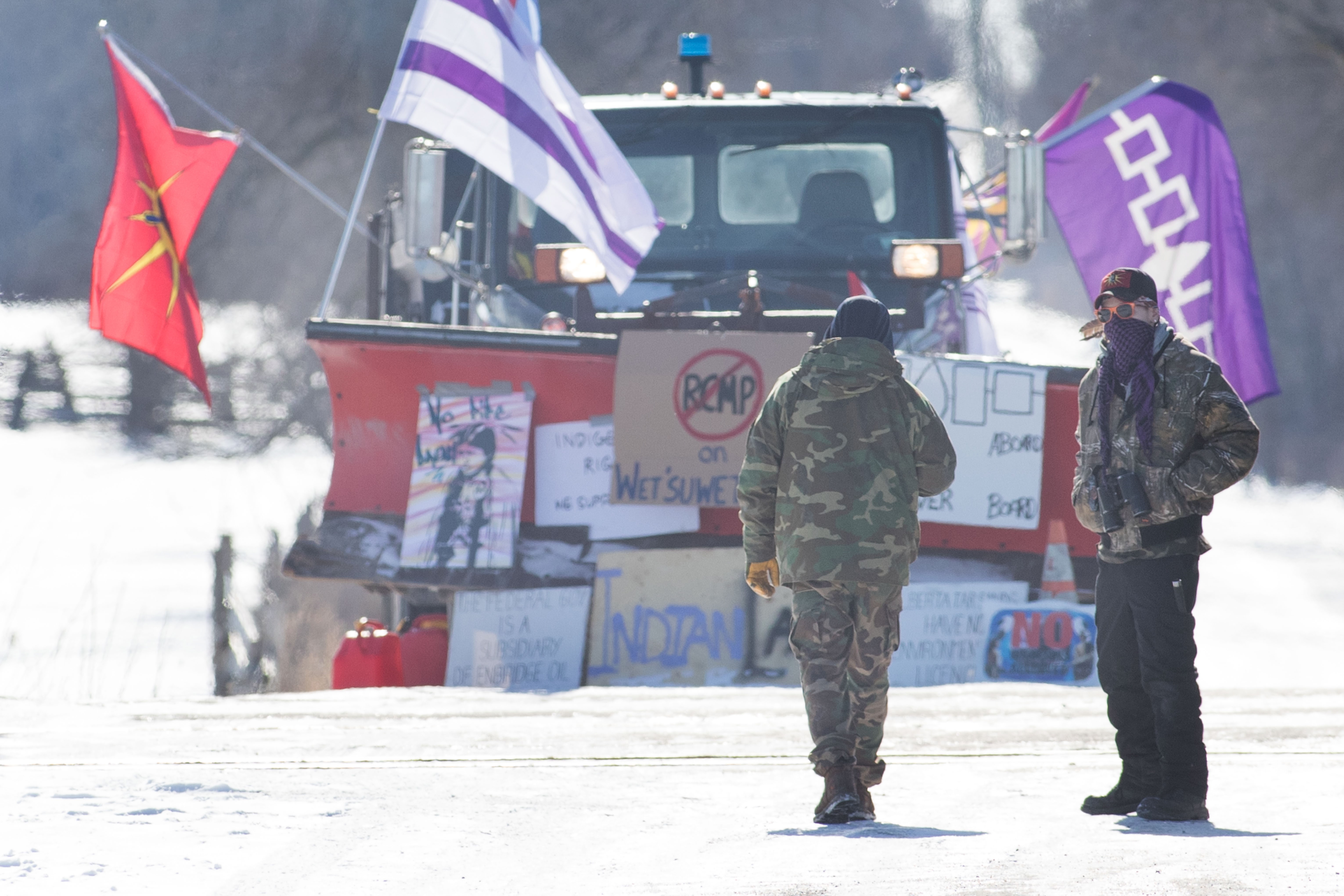Indigenous-Led Rail Blockades Could Cost ‘Billions’ and That’s the Point: Organizers

Credit to Author: Anya Zoledziowski| Date: Fri, 14 Feb 2020 18:24:40 +0000
Canada’s CN railway system screeched to a halt this week amid political mobilization by Indigenous youth supporting Wet’suwet’en Nation in its ongoing fight against a $6.6 billion pipeline.
Via Rail also shut down most passenger travel routes traveling along CN tracks.
Protesters have blocked railway routes in B.C., Manitoba, and across eastern Canada, including in Montreal, Ottawa, and Toronto, and more than 400 trains have been cancelled so far.
Authorities have managed to dismantle the protests in Manitoba and will likely put an end to those in B.C. soon, but in Ontario, CN is still waiting for a court order that’ll sanction police assistance, and potentially, arrests.
CN claims that the temporary shutdown might lead to layoffs in the future. Teamsters Canada, which represents rail workers, said 6,000 jobs are at risk.
The event has garnered scrutiny from people who say the railway blockades are breaking the law, but organizers want to remind Canadians that non-violent disruption is part of effective political protest.
Kakeka ThunderSky, a 21-year-old Anishinaabekwe activist currently mobilizing in Winnipeg, said she’s “happy and proud” that the railways are being blockaded.
“Knowing that the railway is affecting Canada’s comfort and economy in solidarity with Wet’suwet’en is powerful,” ThunderSky said. “It’s also good to know that across the country, we aren’t staying silent and we aren’t staying complicit.”
Prime Minister Justin Trudeau was guarded in his comments on the situation.
“We recognize the important democratic right—and will always defend it—of peaceful protest. But we are also a country of the rule of law, and we need to make sure those laws are respected,” Trudeau said, while speaking in Senegal.
Indigenous youth have been staging sit-ins and blockades across Canada since February 6. CN announced a temporary halt on most eastern routes early Thursday. Later the same day, most Via Rail train services in Canada were also cancelled.
Indigenous youth have faced backlash from people who believe the railway blockades are an illegal step too far. Even before the route closures were announced, one National Post columnist equated protesters to mobs and anarchists. Another referred to mobilizers as “illegals” and said, “this is not protest, it is insurrection.” Outgoing Conservative Party leader Andrew Scheer urged RCMP to put an end to the blockades, and told Indigenous activists to “check their privilege,” the Toronto Star’s Alex Ballingall reported.
Blocking railway routes is against the law, but Wet’suwet’en land defenders argue that the development of the Coastal Gaslink pipeline through their territory also breaches legal precedent and constitutional right.
Canada’s Supreme Court acknowledged Indigenous land title in its historic 1997 Delgamuukw decision.
"The Supreme Court established that Wet'suwet'en had never extinguished title to our territories," Molly Wickham, a governance director at the Office of the Wet'suwet'en told CBC News. "Within Western law, they have acknowledged that we still have title to our territories—and this is an issue about title."
Canada’s constitution protects Indigenous rights and title.
“Canada and B.C. are desecrating Wet’suwet’en territory and there is no reason why they should expect convenience,” said Ta’Kaiya Blaney, a 19-year-old who has been organizing for more than a week. “You can’t compare temporary inconveniences and minor disruptions to the ongoing, 500-year legacy of colonialism and genocide.”
When people in power—police, media—discredit the legitimacy of Indigenous-led protests, and fail to include Indigenous voices, it leads to anti-Indigenous racism, Blaney said.
“I want to make it clear that these false and misleading and inaccurate depictions expose us to white supremacists and threaten our safety,” Blaney said. “This isn’t about pipelines, it’s about preserving who we are as people.”
The protests aren’t violent, Blaney added, and there is no intention to escalate them.
Kolin Sutherland-Wilson, 26, is from Gitxsan Nation in northwest B.C. and has organized alongside Blaney.
He said he recognizes that the railway blockades are disruptive and could cost the governments billions of dollars—but that’s kind of the point. (Economists last year put the estimated a several-week-long CN Rail strike could cost the Canadian economy as much as $3.1 billion.)
“What is happening in Wet’suwet’en sets a precedent for every other nation-to-nation interact in Canada in the future,” Sutherland-Wilson said. “We are supporting Wet’suwet’en, but people are also standing up for their own rights.”
“This is the cutting edge of Indigenous relations…it involves numerous Indigenous nations standing up to the Canadian state,” he added.
Land defenders have been working together to protect unceded Wet’suwet’en territory from pipeline construction by occupying proposed development sites. On February 5, the RCMP confirmed it would be enforcing a B.C. Supreme Court order, allowing officers to forcibly remove land defenders and make way for construction of the Coastal GasLink pipeline. Dozens of RCMP officers stormed into Wet’suwet’en land defender camps at 5 a.m. the following day with tactical officers, dog teams, and drones equipped with infrared sensors. It took five days and 28 arrests for the raids on Wet'suwet'en territory to stop. The RCMP detained multiple journalists attempting to document their actions.
Indigenous nations and allies continue to voice solidarity with Wet’suwet’en Nation, and Blaney said teams across Canada will continue to show support.
“We’re drawing on the force of Indigenous resistance and social movements from across the world,” she said. “We wish to demonstrate the commitment to progressive Indigenous relations—and that does not include violence.”
Meetings have since been scheduled between Indigenous leaders and federal ministers to end the rail blockades and restore train service.
Follow Anya Zoledziowski on Twitter.